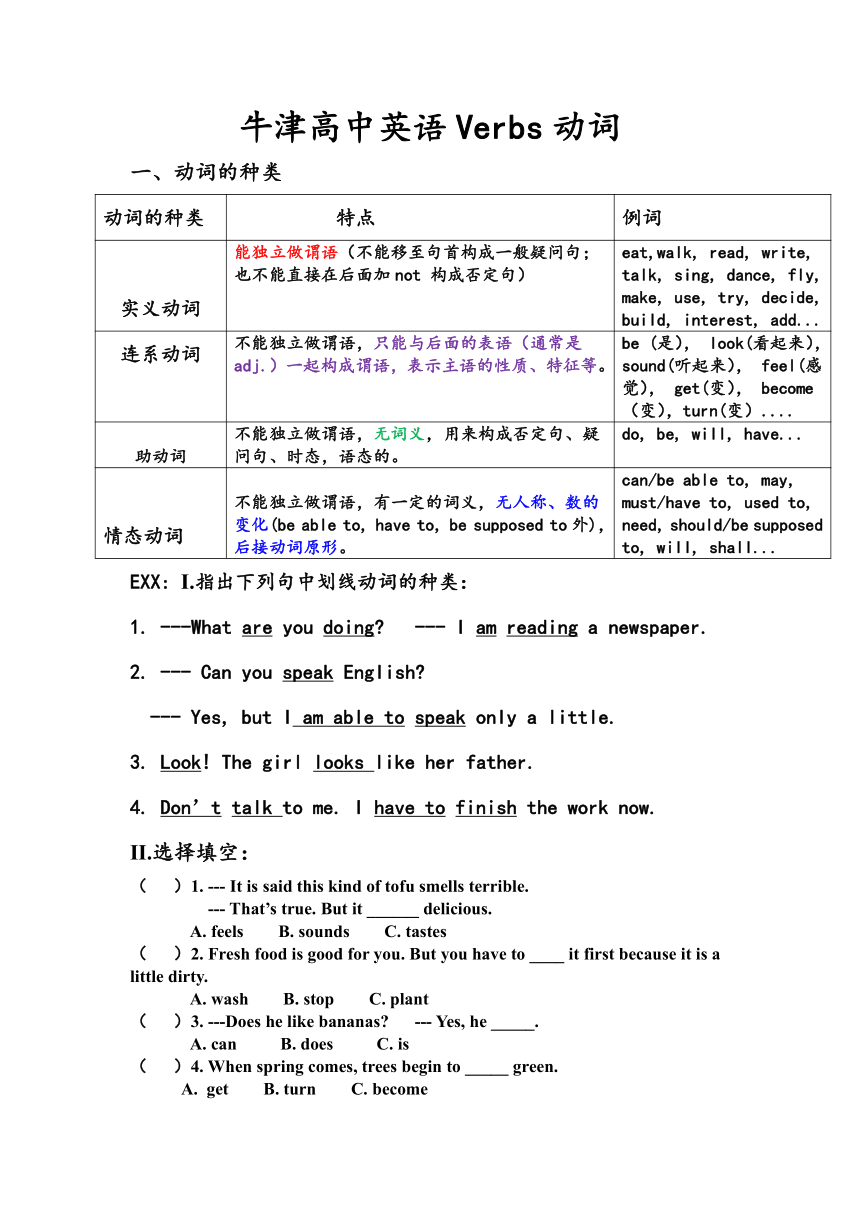
牛津高中英语Verbs动词 一、动词的种类 动词的种类 特点 例词 实义动词 能独立做谓语(不能移至句首构成一般疑问句;也不能直接在后面加not 构成否定句) eat,walk, read, write, talk, sing, dance, fly, make, use, try, decide, build, interest, add... 连系动词 不能独立做谓语,只能与后面的表语(通常是adj.)一起构成谓语,表示主语的性质、特征等。 be (是), look(看起来), sound(听起来), feel(感觉), get(变), become(变),turn(变).... 助动词 不能独立做谓语,无词义,用来构成否定句、疑问句、时态,语态的。 do, be, will, have... 情态动词 不能独立做谓语,有一定的词义,无人称、数的变化(be able to, have to, be supposed to外),后接动词原形。 can/be able to, may, must/have to, used to, need, should/be supposed to, will, shall... EXX: I.指出下列句中划线动词的种类: --What are you doing? -- I am reading a newspaper. -- Can you speak English? -- Yes, but I am able to speak only a little. Look! The girl looks like her father. Don’t talk to me. I have to finish the work now. II.选择填空: ( )1. -- It is said this kind of tofu smells terrible. -- That’s true. But it _____ delicious. A. feels B. sounds C. tastes ( )2. Fresh food is good for you. But you have to ____ it first because it is a little dirty. A. wash B. stop C. plant ( )3. --Does he like bananas? -- Yes, he _____. A. can B. does C. is ( )4. When spring comes, trees begin to _____ green. get B. turn C. become 二、情态动词(can, may, must, have to, be able to, be supposed to, should, could,would) 1. 情态动词没有人称和数的变化,后面接动词原形。变疑问句、否定句与be动词雷同(但是have to?不一样,而且be able to, be supposed to be 有人称、数、时态的变化)。如: I can help you.????????? Can I help you? Yes, I can. /No, I can’t. You may sit here. May I sit here? Yes, you may(can)./No, you can’t(mustn’t.) He must go now.??????Must he go now? Yes, he must. /No, he needn’t. He has to wear a uniform at school.????????? ?Does he have to wear a uniform at school? Yes, he does./No, he doesn’t. She is able to swim. Is she able to swim? Yes, she is. /No, she isn’t. We are supposed to save water. Are we supposed to save water? Yes, you are. No, you aren’t. 以may开头的一般疑问句,其否定回答要以can’t/mustn’t结尾;以must 开头一般疑问句,其否定回答要以needn’t /don’t have to结尾; 以could开头的一般疑问句,其否定回答要以can’t结尾; 1)--Must we finish our homework now? -- No, you _____. A. mustn’t B. can’t C. don’t D. needn’t 2)-- May I go home now? -- Sorry,you _____. A. may B. mayn’t C. can’t D., needn’t 3)-- Could you take out the rubbish? -- Sorry, I _____. I have to take care of my baby sister. A. couldn’t B. mustn’t C. needn’t D. can’t 4) -- My head feels very hot, maybe I have a fever. -- You _____ take your temperature(量体温). A. should B. can C. may D. could 情态动词用法口诀: 情态动词要记牢,动词原形来跟梢。 不管人称单复数,现在过去乐逍遥。 can 表“能力”和“许可”,“猜测”只能否定叫。 换成过去“能”could,“许可”“猜测”都要得, “许可”“可能”may 来表,然而“猜测性”大不了。 回答“ ... ...
~~ 您好,已阅读到文档的结尾了 ~~

